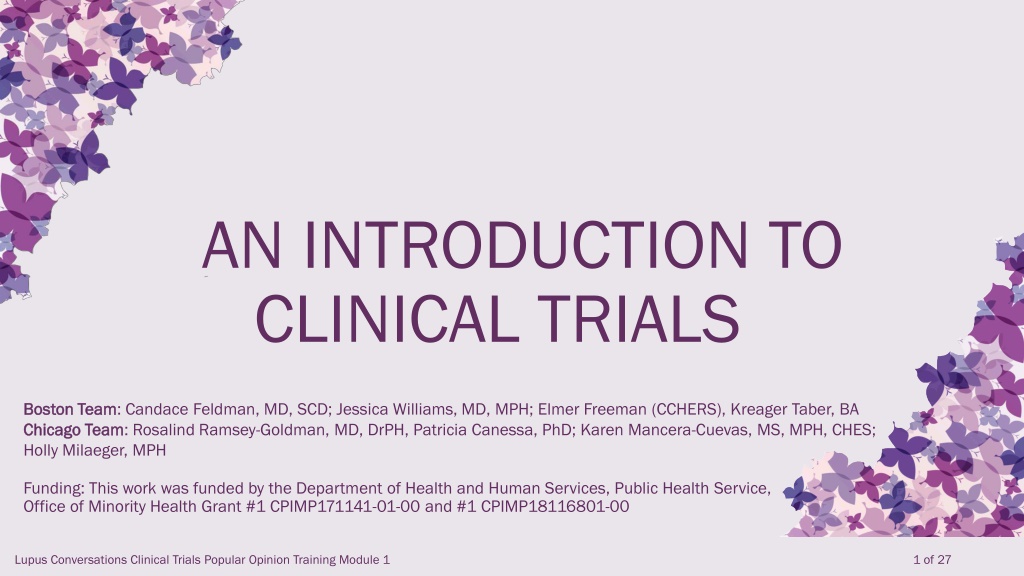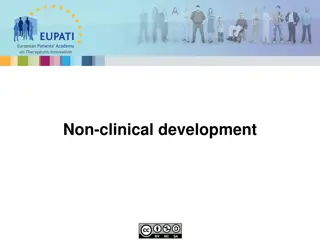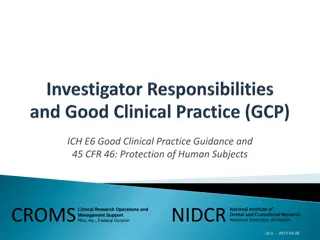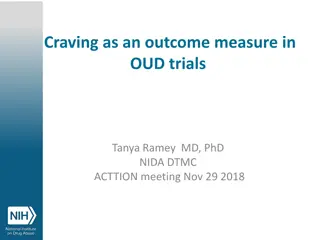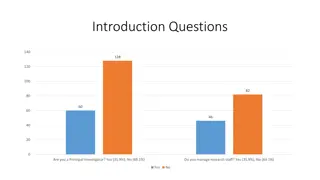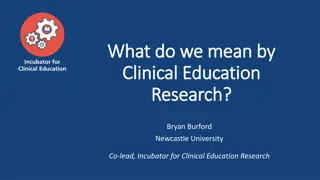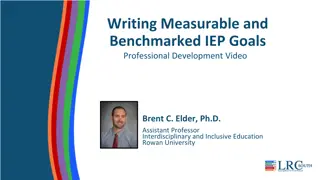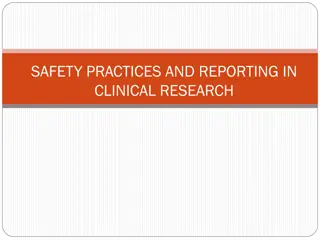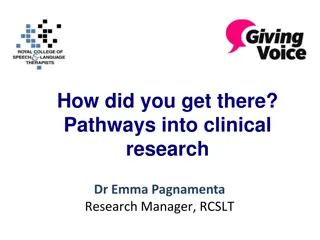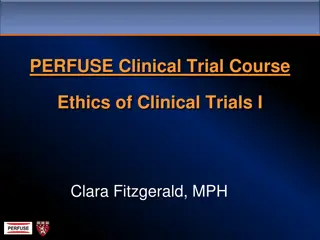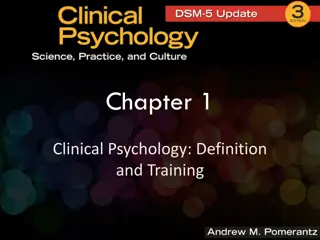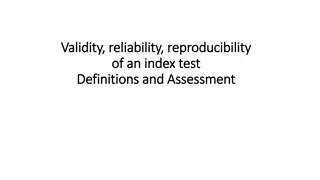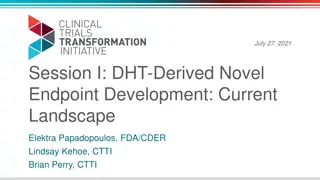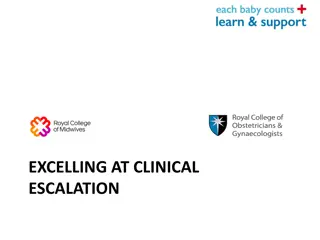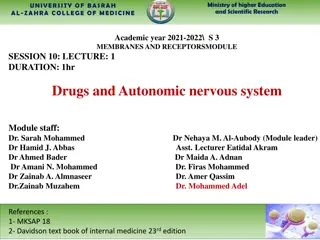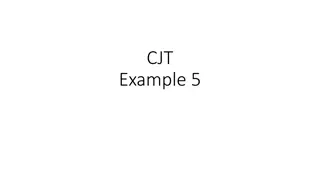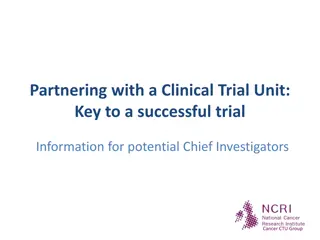Understanding the Importance and Goals of Clinical Research
Clinical research plays a crucial role in advancing healthcare by providing valuable insights into new treatments and disease prevention strategies. It helps uncover the impacts, patterns, causes, and effects of health and diseases among populations. Key goals include studying epidemiological factors, behavioral influences on health, and assessing healthcare service accessibility and costs. Through research, patients, physicians, and scientists gain critical knowledge for improving medical care and finding cures for diseases.
Download Presentation

Please find below an Image/Link to download the presentation.
The content on the website is provided AS IS for your information and personal use only. It may not be sold, licensed, or shared on other websites without obtaining consent from the author. Download presentation by click this link. If you encounter any issues during the download, it is possible that the publisher has removed the file from their server.
E N D
Presentation Transcript
AN INTRODUCTION TO CLINICAL TRIALS Boston Team Boston Team: Candace Feldman, MD, SCD; Jessica Williams, MD, MPH; Elmer Freeman (CCHERS), Kreager Taber, BA Chicago Team Chicago Team: Rosalind Ramsey-Goldman, MD, DrPH, Patricia Canessa, PhD; Karen Mancera-Cuevas, MS, MPH, CHES; Holly Milaeger, MPH Funding: This work was funded by the Department of Health and Human Services, Public Health Service, Office of Minority Health Grant #1 CPIMP171141-01-00 and #1 CPIMP18116801-00 Lupus Conversations Clinical Trials Popular Opinion Training Module 1 1 of 27
Why is Research Important? Helps patients, physicians, and scientists gain important knowledge about the safety of new procedures, devices, or treatments Leads to new methods of preventing, diagnosing, treating, and finding the cures for diseases 2 of 27
What is Clinical Research? What is Clinical Research? Research Research: collecting and using information to find new answers to problems Clinical Research Clinical Research: all research involving people What are the goals of clinical research? 3 of 27
Goals of Clinical Research Goals of Clinical Research Study the impacts, patterns, causes, and effects of health and disease across a group ( Epidemiology Epidemiology ) For example: For example: A study looking at if exposure to a toxic site was related to a higher incidence of lupus 4 of 27
Goals of Clinical Research The purpose of the study is to understand how patients actions affect their health ( Behavioral ) ( Behavioral ) For example: For example: A study looking at whether or not lupus patients are more likely to wear sunscreen during the summer if a mobile app sends them daily reminders 5 of 27
Goals of Clinical Research Examines how patients access health care services, and how much health care services cost the patient and the health care system ( Health Services ) Services ) ( Health For example: For example: A study examining the costs of care for patients with lupus 6 of 27
Goals of Clinical Research Evaluate effects of a specific treatment or Evaluate effects of a specific treatment or medication on the people s health ( Clinical medication on the people s health ( Clinical Trials ) Trials ) For example: For example: A study examining whether injection or infusion of the drug Belimumab is as effective for treating skin and joint lupus symptoms compared to the current standard- of-care treatment 7 of 27
The goal of clinical trials is to: A. Study the impacts, patterns, causes, and effects of health and disease B. Examine how patients access health care services C. Evaluate effects of a specific treatment or medication on the people s health D. All of the above 8 of 27
Who Can Participate in Clinical Trials? Criteria Criteria- - Definition of a group that allows something to be studied (ex: SLE Diagnosis Type, Age, Sex) Identifies a target population of individuals who are similar similar in a set of ways (e.g. age, sex, disease activity level) Each study has its own inclusion criteria who can can participate in a trial and why For example: One study may enroll patients who have lupus in their kidneys. Another study may enroll patients who have been diagnosed with lupus in the past year. inclusion criteria to define why 9 of 27
Who Cannot Participate in Clinical Trials? Each study has its own exclusion criteria exclusion criteria to define who cannot cannot participate and why For example: exclusion of patients with renal lupus Other reasons for exclusion: Treatment may not be safe for individuals with certain other illnesses A disease may either be too active or inactive to be able to test whether a new medication will work safely and effectively 10 of 27
How do Clinical Trials Work? A Protocol Protocol is a Roadmap for the Study How long the study lasts Information that is collected An Institutional Institutional Review Board (IRB) Review Board (IRB) checks this roadmap to make sure it is safe for patients risk protection study rules eligibility study goals 11 of 27
In order to finish the study and get to the end of the road, we have to know the way we want to go first We need to know the study s goals, eligibility, risks and benefits, and how long it will last before we start going down the road This lets us know the safest safest way to get there 12 of 27
The Belmont Report The Belmont Report Published in 1979 and established the guidelines for ethics in medical research 13 of 27
Respect for Persons Respect for Persons People have the ability to decide if they want to participate, not participate, or withdraw from a study People who are not able to consent because of age, illness, or mental disability must be protected For example, a child with lupus cannot participate in a study unless his/her parents or guardian consents 14 of 27
Beneficence Beneficence Research must make all efforts to maximize the benefits of the research and minimize risks For example, patients with severe lupus kidney disease were not able to participate in a study comparing the drug belimumab to standard lupus treatment The initial data from the trial suggested that the standard of care for kidney lupus was better 15 of 27
Justice Justice Patients cannot be denied treatment because they don t want to participate in research Risks and benefits of the study must be described equally, and good AND bad results must be shared For example, if a patient is enrolled in a clinical trial comparing the effects of belimumab on lupus symptoms to a placebo, they should be told about the side effects AND the potential benefits of the drug 16 of 27
Institutional Review Board (IRB) IRBs IRBs are committees that review the safety and ethics of research protocols. They are made of community members community members and are independent independent of the study. Each institution has its own IRB Make sure that all participants are treated fairly, equally, and ethically, fairly, equally, and ethically, and that benefits of each study outweigh risks 17 of 27
Informed Consent Taking part in a clinical trial is OPTIONAL and participants can withdraw at any time! Taking part in a clinical trial is OPTIONAL and participants can withdraw at any time! Informed Consent Informed Consent- - conversation that provides potential participants with information about the study to allow them to choose not to participate choose whether or Member of the research team talks through the details of the study, answers questions, and provides a consent document to review with the person considering participating in research study. They give the person time to review material and make their decision. 18 of 27
Example of Informed Consent Document Informed Consent Document Begins by explaining the basics of the study Study Details Study Details What is being studied? Who is paying for it? IRB number Shows that the study plan was reviewed by the IRB Who is performing the study? How can you contact them? How many participants does the study need? How many places will they try to recruit participants? Study Purpose Study Purpose Why is this study being done? Why is this study important? Info Who, What, Where, and Who, What, Where, and Why Why 19 of 27
Example of informed consent document Informed Consent Document The Informed Consent Document will then describe how how the study will be done Protocol (roadmap) Protocol (roadmap) What is the study design? Will participants be randomized into groups? Who will be blinded ? What will happen during the study? Number of visits? What will happen at each visit? What information (medical history, examination, blood sample, questionnaires, treatment) will be collected or given at each visit? The kind of information or treatment may be different at each visit Are placebos used? Info 20 of 27
Example of informed consent document Informed Consent Document Risks of the Study Risks of the Study Common risks include: Your health may or may not improve Blood draw risk Confidentiality risk Pregnancy risk The document will then provide new information that might impact your participation Risks Risks and Benefits Benefits of enrolling in the study Info Benefits of the Study Benefits of the Study Common benefits include: Access to expert medical care Learning more about a health condition you have Some risks and benefits are unknown 21 of 27
Example of informed consent document Informed Consent Document Payment for participation Payment for participation How much How much will you be paid? When When will you be paid? What do you have to do in the study to be paid? Alternative Treatment Alternative Treatments Are there other ways to treat the condition being studied? You must be told of these options if they exist Payment for study Payment for study- -related injury related injury What will happen if you get hurt or sick from something in the study? What might be charged to your insurance? Only would happen if the event is due to a pre-existing condition or if you aren t following the study procedure The document will then explain the payment payment for the study and other treatments treatments for the condition being studied Researchers want to make sure Researchers want to make sure that participants are choosing that participants are choosing the best option for them the best option for them other Info The document will also explain what will happen if you become sick or hurt during the study 22 of 27
Example of informed consent document Informed Consent Document The document will then explain how you can stop participating participating in the study if you don t want to continue Volunteer Participation and Volunteer Participation and Withdrawal Withdrawal How can you tell the study staff you don t want to participate in the study anymore? Why might your doctor or the study sponsor want you to stop the study? stop Explains how your information will be kept private private Info Confidentiality Confidentiality Permission to review your medical records List of who may see the information collected during the study, including laboratory test results 23 of 27
Example of informed consent document Informed Consent Document Explains what the study team will do to protect your privacy Who will see the data and when they will stop collecting new data HIPAA Authorization HIPAA Authorization Protections to respect privacy From the Health Insurance Portability and Accountability Act of 1996 Lists who look at your medical record and study data Tells you when the study team will stop collecting new data and when your consent for the study expires Info At the end, you will sign document to consent sign the Signatures Signatures Your consent Person who reviewed and consented you 24 of 27
Questions? Thank you! Thank you! Questions? 25 of 27
Words to Remember Epidemiology Epidemiology- - Study the impacts, patterns, causes, and effects of health and disease across a group Behavioral Behavioral- - aims to better understand a person s actions on his/her health Health Services Health Services- - Examines how patients access health care services, and how much health care services cost the patient and the health care system Clinical Trials Clinical Trials- - Evaluate effects of a specific treatment or medication on the people s health Criteria Criteria- - Definition of a group that allows something to be studied (ex: SLE Diagnosis Type, Age, Sex) Inclusion criteria Inclusion criteria- - list that defines who can can participate in a trial and why Exclusion criteria Exclusion criteria- - list that defines who cannot cannot participate in a trial and why Active SLE Active SLE- - Lupus symptoms are worse than normal and patient is having a lupus flare Inactive SLE Inactive SLE- - Lupus is in remission and patient is not having active lupus symptoms 26 of 27
Funding and Acknowledgements Funding: This work was funded by the Department of Health and Human Services, Public Health Service, Office of Minority Health Grant #1 CPIMP171141-01-00 and #1 CPIMP18116801-00 Boston Team: Boston Team: Candace Feldman, MD, ScD; Jessica Williams, MD, MPH; Elmer Freeman (CCHERS), Kreager Taber, BA Chicago Team Chicago Team: Rosalind Ramsey-Goldman, MD, DrPH, Patricia Canessa, PhD, Karen Mancera-Cuevas MS, MPH, CHES; Holly Milaeger, MPH 27
